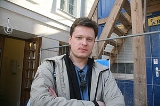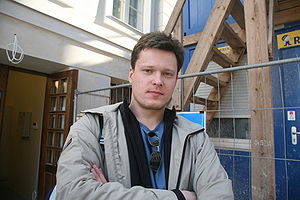
Jaak Urmet
Encyclopedia
Jaak Urmet is an Estonian writer.
 Jaak Urmet studied Estonian philology and history (from 1997 to 2002) at the Tallinn Pedagogical University and from 2002 to 2004 literary theory
Jaak Urmet studied Estonian philology and history (from 1997 to 2002) at the Tallinn Pedagogical University and from 2002 to 2004 literary theory
(the same university), graduated as M.A. Urmet participated Tallinna Noored Tegijad (a fellowship of young authors in Tallinn) from 1998 to 2000 and is a member of Tartu Noorte Autorite Koondis since 2000. From 2006 on, Urmet is a member of the Tallinn Club of Bibliophiles, from 2007 on a member of the Estonian Society of Literature and the Estonian Union of Writers.
Urmet started publishing articles, reviews and essays in 1999. In 2000, he made his debut as a poet with the collection "Maaaraamat". From 2001 to 2007 he worked as the editor of Arkaadia, a cultural addendum of Eesti Päevaleht
. Wimberg's (Urmet's) novel "Lipamäe" (which was noted on 2002 Estonian novel contest and awarded Virumaa
prize of literature in 2002) is a postmodernist
story of a young man who moves from urban area to countryside after the death of his grandfather. The novel shows a blend of realism
and phantasy: autobiographic reflections on the last decade of the Soviet era in countryside alterate with magic present (e.g. one of the characters is the devil). The events take place in a real location – the village of Kaaruka
in Järvamaa.
Wimberg's collections of poetry ("Maaaraamat" and "Kärppsed") depict autobiographic thoughts. In his works, Wimberg uses (his own) innovative orthography
of Estonian language.

Literary theory
Literary theory in a strict sense is the systematic study of the nature of literature and of the methods for analyzing literature. However, literary scholarship since the 19th century often includes—in addition to, or even instead of literary theory in the strict sense—considerations of...
(the same university), graduated as M.A. Urmet participated Tallinna Noored Tegijad (a fellowship of young authors in Tallinn) from 1998 to 2000 and is a member of Tartu Noorte Autorite Koondis since 2000. From 2006 on, Urmet is a member of the Tallinn Club of Bibliophiles, from 2007 on a member of the Estonian Society of Literature and the Estonian Union of Writers.
Urmet started publishing articles, reviews and essays in 1999. In 2000, he made his debut as a poet with the collection "Maaaraamat". From 2001 to 2007 he worked as the editor of Arkaadia, a cultural addendum of Eesti Päevaleht
Eesti Päevaleht
Eesti Päevaleht is a major daily Estonian newspaper, from the same publishers as the weekly Eesti Ekspress. It has a daily circulation of around 36,000....
. Wimberg's (Urmet's) novel "Lipamäe" (which was noted on 2002 Estonian novel contest and awarded Virumaa
Virumaa
Virumaa is a former independent county in Ancient Estonia. Now it is divided into Ida-Viru County or Eastern Vironia and Lääne-Viru County or Western Vironia...
prize of literature in 2002) is a postmodernist
Postmodernism
Postmodernism is a philosophical movement evolved in reaction to modernism, the tendency in contemporary culture to accept only objective truth and to be inherently suspicious towards a global cultural narrative or meta-narrative. Postmodernist thought is an intentional departure from the...
story of a young man who moves from urban area to countryside after the death of his grandfather. The novel shows a blend of realism
Realism (arts)
Realism in the visual arts and literature refers to the general attempt to depict subjects "in accordance with secular, empirical rules", as they are considered to exist in third person objective reality, without embellishment or interpretation...
and phantasy: autobiographic reflections on the last decade of the Soviet era in countryside alterate with magic present (e.g. one of the characters is the devil). The events take place in a real location – the village of Kaaruka
Kaaruka
Kaaruka is a village in Roosna-Alliku Parish, Järva County in northern-central Estonia....
in Järvamaa.
Wimberg's collections of poetry ("Maaaraamat" and "Kärppsed") depict autobiographic thoughts. In his works, Wimberg uses (his own) innovative orthography
Orthography
The orthography of a language specifies a standardized way of using a specific writing system to write the language. Where more than one writing system is used for a language, for example Kurdish, Uyghur, Serbian or Inuktitut, there can be more than one orthography...
of Estonian language.
Published in English
- Excerpt from the novel "Lipamäe" (translated in English by Ulvi Haagensen, Estonian Literary Magazine no. 17, Autumn 2003)
- Interview by Sven Vabar (Estonian Literary Magazine no. 17, Autumn 2003)
- Selected poems in "Viie tunni tee. Five Hours Away", Nordic Poetry Festival 2001 booklet (translated in English by Kalju Kruusa, Põhjamaade Ministrite Nõukogu Tallinna Infobüroo, Tallinn 2001)
- Review of novel "Pille-Riin" by Jürgen Rooste (Estonian Literary Magazine no. 30, Spring 2010)

